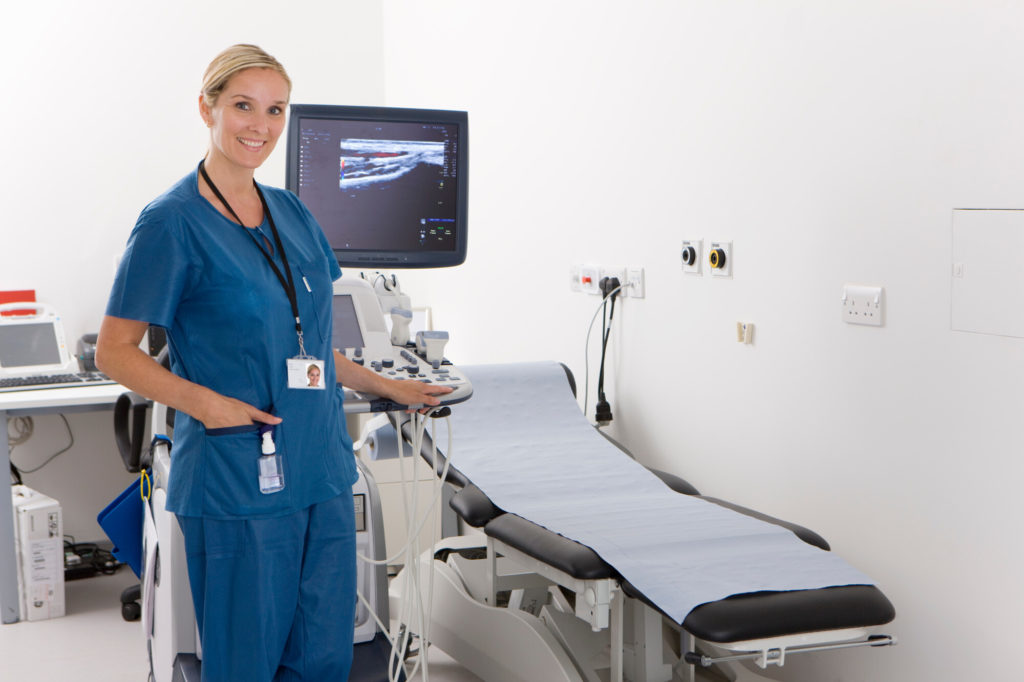DMS Career
How to Launch a Career in Diagnostic Medical Sonography
The job outlook is bright for diagnostic medical sonographers with approximately 9,600 job openings each year, and this is only expected to increase as healthcare needs evolve with the aging population.
In addition, diagnostic medical sonography is a rewarding field that allows you to gather the information needed to diagnose various medical conditions. Walking through the steps of how to launch a career in medical sonography will help you get moving in the right direction.
Keep reading this guide to learn how to start a fulfilling career as a diagnostic medical sonographer.
What Does a Medical Sonographer Do?
A medical sonographer, also known as an ultrasound technician, utilizes a special instrument called a transducer to produce pictures of different body parts. Producing these images depends on sonography, which involves high-frequency sound waves that can produce images of your body’s tissues and organs.
Sonographers use the transducer to scan various body parts which sends out sound pulses. These pulses bounce back and cause echos that ultimately form images on the computer screen.
As a sonographer, you’ll also have other responsibilities that include:
- Preparing the exam room
- Maintaining ultrasound equipment
- Checking patients’ prior images
- Recording medical histories
- Analyzing imaging results
- Checking imaging for abnormalities
- Updating medical records
- Performing clerical duties
Your duties can vary depending on the type of ultrasound technician you are. You’ll typically find work in hospitals, doctors’ offices, imaging centers, and OB/GYN clinics. It’s also common to find work in emergency rooms and vascular laboratories.
Types of Sonographers
There are a variety of sonographer roles you can try. For example, you can focus on imaging joints and ligaments, breast imaging, or pediatric imaging. However, some of the most common types of ultrasound technicians include:
Vascular Sonographers
Vascular sonographers specialize in taking images of blood vessels which include both arteries and veins. You’ll collect data to help diagnose various diseases that impact blood flow to different areas of the body.
Vascular sonographers are able to detect blood clots or blocked arteries and report this data quickly.
Obstetric and Gynecologic Sonographers
Obstetric sonographers primarily take images to evaluate pregnancies and track the fetus’s growth. You’ll take pictures of the fetus’s head, heart, internal organs, and limbs to help identify any health issues.
Gynecologic sonographers focus on taking images of the entire female reproductive system. You’ll be able to evaluate different health conditions like endometriosis and look for causes of pelvic pain.
Cardiac Sonographers
Cardiac sonographers or echocardiographers specialize in taking images of the heart. In this role, you’ll evaluate the heart’s valves, vessels, and chambers. This includes measuring the shape and thickness of the heart’s walls.
You may also do stress echocardiograms, which involve the person exercising on a treadmill during the test. You’ll have to evaluate how the heart responds to stress.
You may also be responsible for performing echocardiograms on fetal hearts to help diagnose conditions during pregnancy.
How Do You Become a Sonographer?
To become a diagnostic medical sonographer, you’ll need a formal education to learn basic sonographer skills. You’ll need to do some research to find a sonography program in your area that teaches you the essential skills you need.
Finding a Sonography Program
Your first step is finding an accredited sonography training program. For example, the Diagnostic Medical Sonography Program from Healthcare Career College in South Los Angeles is a nationally accredited program centered around career-focused training.
This means you’ll have access to programs that allow you to focus on relevant skills and enter into the workforce as quickly as possible.
In most cases, you’ll need a high school diploma or GED to enroll in a program. Ultrasound technician programs give a combination of hands-on training and healthcare technology knowledge that gives you the skills employers are looking for.
The most common skills you’ll learn include:
- Medical terminology
- Anatomy and physiology
- Instrumentation
- Obstetrics and gynecology
- Vascular and echocardiography
- Breast sonography
- Emergency sonography
You’ll also learn about musculoskeletal sonography along with small parts like the prostate and thyroid.
The Healthcare Career College ultrasound tech program has two different tracks you can take, which include:
Diagnostic Medical Sonography Diploma Program
If you’re looking for a fast track toward sonography in healthcare, this diploma program may be right for you. This program is 19 months in length and is best for people interested in a faster, less in-depth approach.
The best part of getting a diploma is that you’ll learn the basic skills you need to qualify for a job upon graduating.
Healthcare Career College helps you with job placement, so you’ll already be prepared to access jobs in your area once you graduate.
Diagnostic Medical Sonography Associate’s Degree Program
The diagnostic medical sonography associate degree program is 24 months in length. This program is more involved and you’ll receive hands-on training that helps you increase your knowledge.
The benefit of an associate’s degree program is it can lead to increased job opportunities once you graduate. Often employers look for at least an associate degree, especially if you want to go into a specialized field like cardiac sonography.
As with the diploma program, you’ll receive job placement assistance that helps you find a job that matches your skills and education.
Graduating from an associate degree program also allows you to take credentialing exams like the American Registry of Radiologic Technologists (ARRT). This credential holds ultrasound professionals to strict standards and can make you stand out to potential employers.
Train for a Career in Diagnostic Medical Sonography
Now that you know how to launch a diagnostic medical sonography career, it’s time to begin a medical sonography program.
The Healthcare Career College began offering quality programs in 1990 with the goal of providing a fast career path to employment. Our mission is to provide every student with a training experience that prepares them for a healthcare career.
Our college is located in Paramount, CA and our diagnostic medical sonography program is in South Los Angeles, CA. We also offer other programs like medical assistant, massage therapy, patient care technician, and more.
Contact us today to find out more information about our diagnostic medical sonography programs to start your training.


